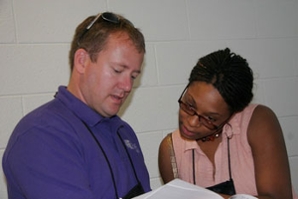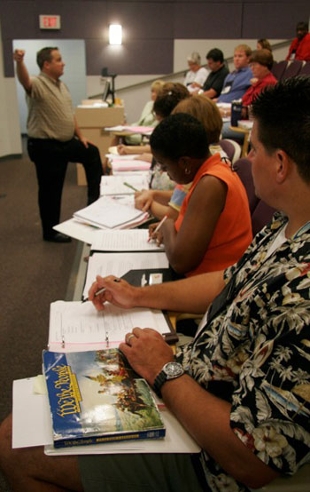"We The People" Curriculum Boosts Understanding of Democracy
NewsBy Janet Smith, JMU Public Affairs

Talk about a natural connection. James Madison University, named for the Father of the U.S. Constitution and renowned for 85 years of teacher preparation, draws from both proud traditions to carry on important civics education.
Since 2001 when it served as the site of the "We the People: The Citizen and the Constitution" Institute for fifth-, eighth- and 12th-grade teachers from throughout Virginia in partnership with Montpelier, the Orange County home of James Madison, JMU has developed increasingly strong links with the Center for Civic Education. Funded by the U.S. Department of Education, the "We the People" curriculum fosters understanding of the history and principles of American constitutional democracy.
"There is a lot of misperception about what politics and politicians are," said William R. Wilson, director of Madison Institutes, the JMU office that coordinates "We the People" national institutes and "We the People" for Virginia's 6th Congressional District as well as "Project Citizen" for Virginia. "There's a lot of negative perception about it. The reality is that politics and politicians and our institutions are how our government functions, for better or worse. So we all need to be knowledgeable and informed so that we can make sure they function for better."
That's the goal of the "We the People" curriculum and the summer institutes. Teachers convene at JMU for intensive one-week professional development sessions to bolster their understanding of the U.S. Constitution, including the Bill of Rights, and to ignite their teaching abilities to connect better with students.
Both the summer institutes for teachers and the "Project Citizen" curriculum - JMU became the "state home" for the latter in May 2008 - aim for increasing students' participation in government through voting and involvement in policy issues.
Wilson explains the difference between the two curricula as "I use the comparison of you've got your owner's manual when you buy a car and then you've got the 'Chilton's Guide.' 'We the People,' that's the 'Chilton's Guide.' It's the thoughts, the processes, the big ideas of how everything comes together. 'Project Citizen,' that's the owner's manual. They tell you how to put the key in, how to put your belt on, how to operate the car safely. We're working with the students so they know how to impact and influence public policy. How to use the mechanizations of their government, how to make them work and how to work with them."
"We the People" Institutes
JMU's involvement with "We the People" institutes has helped prepare over 800 public- and private-school teachers to take civics education methods and content back to their classrooms to reach a conservative estimate of 64,000 students. The university has served as host for separate national institutes for elementary- and middle-school teachers as well as the Virginia institute.

Students whose teachers participate in the institutes learn much more than basic facts, dates and interesting constitutional trivia. "We have fifth graders talking about Locke and Hobbes and the philosophers that were the foundations upon which Madison, Jefferson, Hamilton and the other Founding Fathers built these grand ideas, these grand systems," Wilson said. "We're exposing them to that philosophy and those ideas and that background so they can better understand the meaning and intent of the Constitution."
The institutes are rigorous for the participating teachers. Constitutional scholars, including JMU faculty, from all over the country teach institute sessions, explaining the ideas that shaped the founders' framework for government, exploring the writing of the Constitution and contemplating the responsibilities of citizens. The teachers meet in small groups to process what they have learned and to prepare for the week's culminating event, a simulated congressional hearing.
In exchange for no-cost participation in the institutes and an extensive library of constitutional literature, textbooks and other classroom materials, teachers agree to implement the "We the People" curriculum in their schools and to remain in contact with their state program coordinators.
"We the People": Project Citizen
Wilson, who serves as coordinator of Virginia's participation in "Project Citizen," described the curriculum as a study in grassroots citizen participation. Once students have studied the big ideas of the Constitution, they are encouraged to choose a local policy issue to research. Step-by-step they learn how to do their homework to influence public policy.
"One of our middle schools this year looked at where they were located, and there's a shopping center right across the street that has a Starbuck's and everything else, but there were no crosswalks, no good places for the kids to cross the street," Wilson said. "So they addressed that, talking with the school board, city council, the police, to develop their thoughts and ideas on a situation that directly impacts them."
"'Project Citizen' helps participants learn that everything's local and change occurs at the local level," he said. "If you see how it works at the local level, which is much more approachable, then you also understand how it works at the state and national levels."
Like "The Citizen and the Constitution" institutes, "Project Citizen" is administered by the Center for Civic Education with the assistance of a national network of state and congressional district coordinators in every state and is conducted with the assistance of the National Conference of State Legislatures. It is funded by the U.S. Department of Education by act of Congress.
Wilson, who was appointed July 1 to the state's Commission on Civics Education, anticipates increased interest in "Project Citizen" as the commission's members study civics education, including making teachers aware of existing programs. "With the newly defined Standards of Learning in social studies, particularly in civics, 'Project Citizen' is an ideal, lock-step match for those new standards," he said.
A Valuable Partnership
Since forging a relationship eight years ago, "We the People" and JMU officials have developed strong ties through shared philosophy. Not only do "We the People" organizers like working with JMU as a one-stop provider of excellent housing and dining for institute participants, they more importantly like JMU because "they know we as an institution have a commitment to the principles behind what they are doing," Wilson said.
JMU benefits from the partnership because "we're bringing in teachers, plus we have the connection to Madison and our overall institutional mission statement, they just tie in to working with the teachers," Wilson said. "For us, the teachers are the gateway to the students. We are not going to impact fifth through 12th graders as an institution of higher learning directly. We impact them through their teachers and by making them better teachers."

